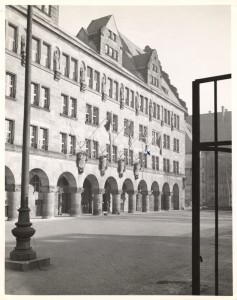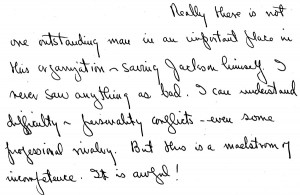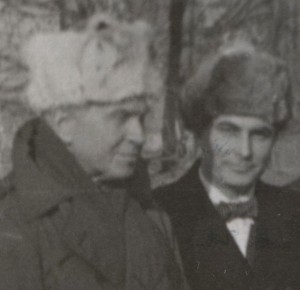On September 25th, Dodd had a breakthrough in his questioning of Dr. Scheidt. Scheidt had been questioned repeatedly about the OKW (Oberkommando der Wehrmacht) files, insisting each time that he burned them all. Dodd’s relentless interrogation paid off when he was able to make Scheidt admit,” All right, I buried some of the most important ones at Berchtesgarden” [p.142, 9/25/1945]. The admission was significant. The existence of even a portion of the files was of unimaginable value and had the potential to be a huge break for the prosecution. Despite his many contributions similar to the one with Scheidt, Dodd saw himself pushed to the side as the staff expanded. As of 24 September 1945, the United States legal team had grown to approximately 250 people and according to Dodd 150 of those were “superfluous and worse” [p. 141, 9/24/45]. As he explained to Grace,” I am no one’s fair-haired boy, I am not in the military, and it is a mess anyway” [p. 142, 9/25/1945]. At this point, it seemed as if Colonel Brundage and Dodd were the only ones making advances on any of the interrogations, and yet two felt that others shared information only grudgingly, if at all. “It is clear to the both of us that we are not wanted by this crowd of jokers…Really there is not one outstanding man in an important place in this organization—saving Jackson
himself. I never saw anything as bad. I can understand difficulty—personality conflicts, even some professional rivalry. But this is a maelstrom of incompetence. It is awful… You will understand if I return sooner than we anticipated.” [p. 145, 9/26/1945].
Thankfully, Dodd was able to take a brief trip and clear his mind of the everyday frictions that were mounting as the opening of the trials neared. Through the good offices of Father Walsh, Dodd and Brundage were scheduled to have a visit with Pope Pius XII while in Rome. As the plane flew above Rome, Dodd was amazed and
delighted with his first view of the picturesque city and said,” Rome is my city. First of all it is quite untouched by the war and for that reason it makes a good impression. But also I like its looks. We rode into Rome on the Apian Way—saw ruins of the ancient viaduct and the walls” [p. 149, 9/28/1945]. For Dodd, this trip although was much more personally significant and not a holiday. They attended a very sentimental and private mass in the room of St. Ignatius in the Gesu Church, observing Anzio beachhead. “It is still a mess. Tanks, guns, destruction on all sides—much more than a year after that fearful affair. We passed the military cemeteries—rows of crosses—it does something
to me.” [p. 151, 9/30/1945] While meeting with the Pope, Dodd received blessing for his family, as well as a few rosaries for the children waiting at home for his return. “Grace, I walked out as if treading on air.” [p. 153, 10/1/1945] Refreshed and reinvigorated, Tom Dodd headed back to Nürnberg to resume his questioning and attempts to piece together the documentation necessary to build the legal case and hold the leaders of the Nazi regime accountable for their crimes against the world.
–Owen Doremus and Betsy Pittman
[Owen Doremus, a junior at Edwin O. Smith High School, is supporting this blog series with research and writing as part of an independent study.]
The majority of the letters from Tom Dodd to his wife Grace have been published and can be found in Letters from Nuremberg, My father’s narrative of a quest for justice. Senator Christopher J. Dodd with Lary Bloom. New York: Crown Publishing, 2007.




